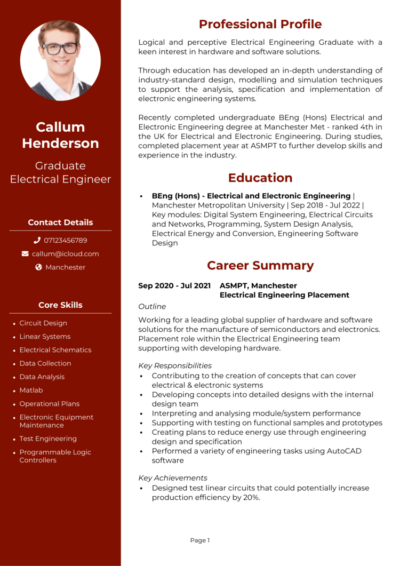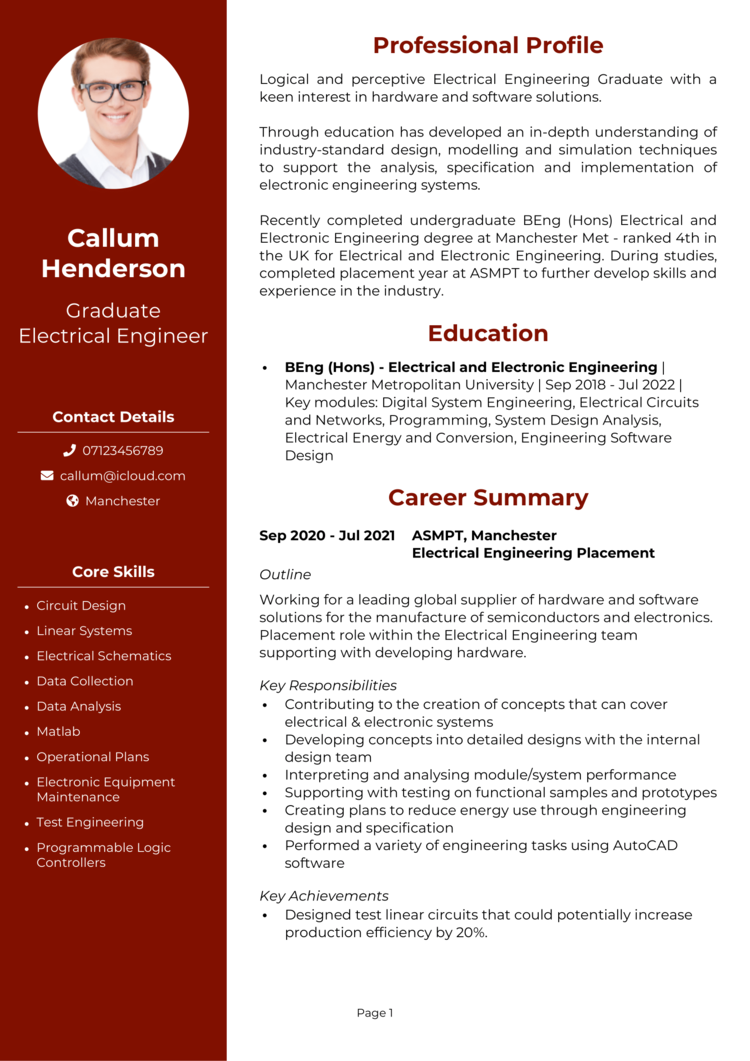Now you’ve graduated, it’s time to find your first exciting position in electrical engineering.
To do this, you need a CV that will spark the recruiter’s interest and secure you an interview.
To help you create a standout application, we’ve put together this handy guide and graduate electrical engineer CV free of charge. Check them out below.
|
Graduate Electrical Engineer CV example
This CV example illustrates the ideal structure and format for your Graduate Electrical Engineer CV, making it easy for busy hiring managers to quickly identify your suitability for the jobs you’re applying for,
It also gives some guidance on the skills, experience and qualifications you should emphasise in your own CV.


Graduate Electrical Engineer CV layout and format
In today’s fast-paced job market, recruiters and employers are often short on time. If they can’t locate the information they’re searching for within a few seconds, it could result in them overlooking your application.
To avoid this happening, it’s critical to structure and format your CV in a way that allows them to quickly identify your key skills and offerings, even when they’re pressed for time.
Tips for formatting your Graduate Electrical Engineer CV
- Length: Even if you’ve got tons of experience to brag about, recruiters don’t have time to read through overly lengthy CVs. Keep it short, concise and relevant – a CV length of 2 sides of A4 pages or less is perfect for the attention spans in today’s job market.
- Readability: Recruiters appreciate CVs that they can quickly scan through without trouble. Ensure yours makes the cut by formatting your headings for attention (bold or coloured fonts should do the trick) and breaking up long paragraphs into smaller chunks or short, snappy bullet points.
- Design: Your CV needs to look professional, sleek and easy to read. A subtle colour palette, clear font and simple design are generally best for this, as fancy designs are often harder to navigate.
- Photos: Don’t add profile photos to your CV unless you work in an industry or region which prefers to see them. Most employers in the UK will not need to see one.
Quick tip: Creating a professional CV style can be difficult and time-consuming when using Microsoft Word or Google Docs. To create a winning CV quickly, try our quick-and-easy CV Builder and use one of their eye-catching professional CV templates.
CV structure
To make it easy for busy recruiters and hiring managers to digest your CV, divide the content into several key sections when writing it:
- Contact details: Always list your contact details at the very top to avoid them being missed.
- Profile: Start with an introductory paragraph that catches recruiters’ attention and summarises your offerings.
- Work experience/career history: List your relevant work experience in reverse chronological order, starting with your current position.
- Education: Provide a concise summary of your education and qualifications.
- Interests and hobbies: You can include an optional section to showcase any hobbies that demonstrate transferable skills.
Now you understand the basic layout of a CV, here’s what you should include in each section of yours.
Contact Details
Begin by sharing your contact details, so it’s easy for employers to give you a call.
Keep to the basics, such as:
- Mobile number
- Email address – It should sound professional, with no slang or nicknames. Make a new one for your job applications if necessary.
- Location – Simply share your vague location, for example ‘Manchester’, rather than a full address.
- LinkedIn profile or portfolio URL – Remember to update them before you send your application.
Graduate Electrical Engineer CV Profile
Grab the reader’s attention by kick-starting your CV with a powerful profile (or personal statement, if you’re a junior applicant).
This is a short introduction paragraph which summarises your skills, knowledge and experience.
It should paint you as the perfect match for the job description and entice recruiters to read through the rest of your CV.
CV profile writing tips:
- Make it short and sharp: It might be tempting to submit a page-long CV profile, but recruiters won’t have the time to read it. To ensure every word gets read, it’s best to include high-level information only; sticking to a length of 3-5 lines.
- Tailor it: No matter how much time you put into your CV profile, it won’t impress if it’s irrelevant to the role you’re applying for. Before you start writing, make a list of the skills, knowledge and experience your target employer is looking for. Then, make sure to mention them in your CV profile and throughout the rest of your application.
- Don’t add an objective: Career goals and objectives are best suited to your cover letter, so don’t waste space with them in your CV profile.
- Avoid generic phrases: If your CV is riddled with clichès like “Dynamic thought-leader”, hit that delete button. Phrases like these are like a broken record to recruiters, who read them countless times per day. Hard facts, skills, knowledge and results are sure to yield far better results.
Example CV profile for Graduate Electrical Engineer
What to include in your Graduate Electrical Engineer CV profile?
- Experience overview: Showcase your aptitude for the job you are aiming for by giving a brief summary of your past work history, including the industries you have worked in, the kinds of employers you have served, and the roles you have held.
- Targeted skills: Ensure that your profile highlights your key skills that are most relevant to your Graduate Electrical Engineer, and tailor them to match the specific job you are applying for. To do this, refer to the job description to closely align your skills with their requirements.
- Key qualifications: If the jobs you are applying to require candidates to have certain qualifications, then you must add them in your profile to ensure they are seen by hiring managers.
Quick tip: If you are finding it difficult to write an attention-grabbing CV profile, choose from hundreds of pre-written profiles across all industries, and add one to your CV with one click in our quick-and-easy CV Builder. All profiles are written by recruitment experts and easily tailored to suit your unique skillset.
Core skills section
Add a core skills section below your profile to draw attention to your most applicable skills and make them stand out to readers.
This should consist of 2-3 columns of bullet points that emphasise your relevant skills.
Before creating this section, review the job description and compile a list of any specific skills, specializations, or knowledge needed. Incorporate these findings into your list to portray yourself as the ideal candidate for the position.
Important skills for your Graduate Electrical Engineer CV
Electrical circuit design – Designing electrical circuits for specific applications and understanding their impact on performance and reliability.
Programming – Utilising knowledge of programming languages such as C++ and MATLAB to develop control algorithms and test electrical systems.
Technical writing – Writing clear and concise technical reports and documentation for projects, designs, and testing.
Power systems analysis – Analysing power systems, identifying issues, and providing solutions, and understanding complex power systems.
Data analysis – Interpreting and analysing data, performing experiments, and troubleshooting problems.
Project management – Managing projects from start to finish, including scheduling, budgeting, and resource allocation.
Problem resolution – Identifying, diagnosing, and resolving complex technical problems related to electrical systems.
Stakeholder communication – Explaining technical concepts to technical and non-technical stakeholders.
Electrical safety – Utilising knowledge of safety procedures, regulations, and standards to ensure safe and reliable operation of electrical systems.
Cross-functional collaboration – Collaborating with team members and stakeholders from different backgrounds to achieve common goals and objectives.
Quick tip: Our quick-and-easy CV Builder has thousands of in-demand skills for all industries and professions, that can be added to your CV in seconds – This will save you time and ensure you get noticed by recruiters.


Work experience section
Next up is your work experience section, which is normally the longest part of your CV.
Start with your current (or most recent) job and work your way backwards through your experience.
Can’t fit all your roles? Allow more space for your recent career history and shorten down descriptions for your older roles.
Structuring each job
Whilst writing your CV, it’s essential to look at it from the eyes of a recruiter.
If they’re met with giant blocks of text which are impossible to navigate, they might get frustrated and skip onto the next CV.
Instead, make use of the 3-step structure shown below, to give them a pleasant reading experience.
Outline
Start with a 1-2 sentence summary of your role as a whole, detailing what the goal of your position was, who you reported to or managed, and the type of organisation you worked for.
Key responsibilities
Use bullet points to detail the key responsibilities of your role, highlighting hard skills, software and knowledge wherever you can.
Keep them short and sharp to make them easily digestible by readers.
Key achievements
Finish off by showcasing 1-3 key achievements made within the role.
This could be anything that had a positive effect on your company, clients or customers, such as saving time or money, receiving exemplary feedback or receiving an award.
Sample job description for Graduate Electrical Engineer CV
Outline
Working for a leading global supplier of hardware and software solutions for the manufacture of semiconductors and electronics. Placement role within the Electrical Engineering team supporting with developing hardware.
Key Responsibilities
- Contributing to the creation of concepts that can cover electrical & electronic systems
- Developing concepts into detailed designs with the internal design team
- Interpreting and analysing module/system performance
- Supporting with testing on functional samples and prototypes
Quick tip: Create impressive job descriptions easily in our quick-and-easy CV Builder by adding pre-written job phrases for every industry and career stage.
Education and qualifications
Next up, you should list your education and qualifications.
This can include your formal qualifications (a degree, A-Levels and GCSEs), as well as sector-specific Graduate Electrical Engineer qualifications and/or training.
While school leavers and recent grads should include a lot of detail here to make up for the lack of work experience, experienced candidates may benefit from a shorter education section, as your work experience section will be more important to recruiters.
Hobbies and interests
Although this is an optional section, it can be useful if your hobbies and interests will add further depth to your CV.
Interests which are related to the sector you are applying to, or which show transferable skills like leadership or teamwork, can worth listing.
On the other hand, generic hobbies like “going out with friends” won’t add any value to your application, so are best left off your CV.


An interview-winning CV for a Graduate Electrical Engineer role, needs to be both visually pleasing and packed with targeted content.
Whilst it needs to detail your experience, accomplishments and relevant skills, it also needs to be as clear and easy to read as possible.
Remember to research the role and review the job ad before applying, so you’re able to match yourself up to the requirements.
If you follow these guidelines and keep motivated in your job search, you should land an interview in no time.
Best of luck with your next application!










